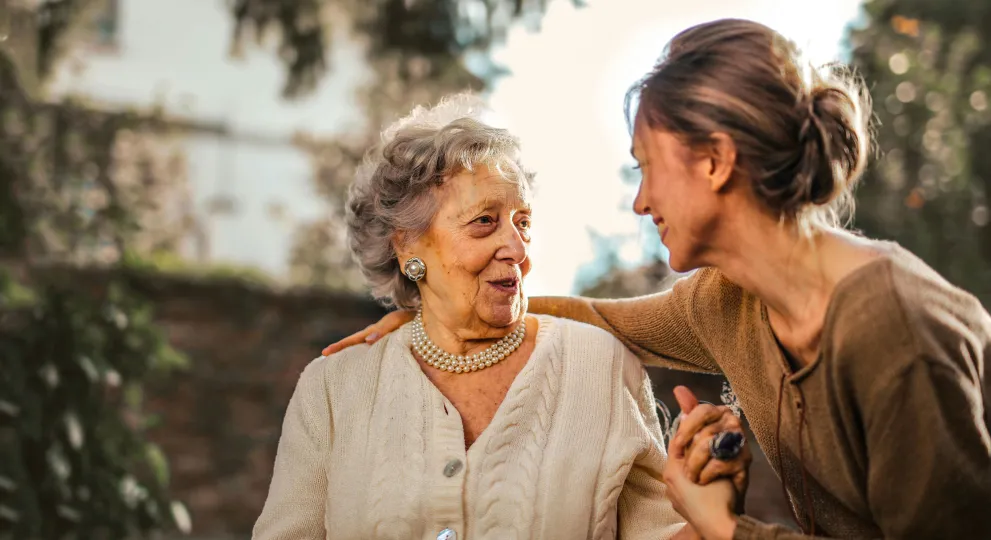5 Mindset Shifts to Help You Cope as a Caregiver
5 Mindset Shifts to Help You Cope as a Caregiver

When a loved one is diagnosed with cancer, life can shift in an instant. Routines may change, priorities realign, and suddenly, you may find yourself in the role of caregiver—a responsibility for which few are fully prepared. Whether it’s managing medications, attending appointments, or providing emotional support, caregiving may come in different shapes and forms.
Being a caregiver can be rewarding, challenging and exhausting. Research shows that caregivers for people living with cancer often need more support from the health care team – such as help with managing symptoms and coordination of care. Other research has found that caregiving may affect mental health. One study found that, globally, an estimated two out of five caregivers for people with cancer screened positive for depression.
Some studies estimate that the value of the unpaid work performed by friends, family members and loved ones as caregivers can exceed $2,000 a month. There are meaningful contributions beyond the cost savings. Having an informal caregiver is associated with better coping capabilities and healthier lifestyle habits in cancer patients.
Here are five personal strategies – based on the advice of people who have been caregivers themselves – to help you find more support, practice self-care and stay present on your caregiving journey.
Let the patient lead. Even when you depend on others for help, autonomy remains a priority for the one receiving care. Include the care recipient in all decisions – including the timing of a medical appointment or the best system for dispensing and tracking medications. And make sure health care providers and other family members don’t fall into the bad habit of talking about the care recipient as if he or she weren’t in the room.
Let comfort be your guide. The person living with cancer may not always take your advice, which may be frustrating. Even in difficult times, try looking for small moments of shared joy such as watching television together, listening to an audio book on the way to an appointment, or eating a favorite food together.
Take care of yourself. It may seem impossible to find five or 10 minutes a day for yourself, but chances are you’ll be a better support system for your loved one if you are able to prioritize some self-care. Simple breathing exercises and counseling sessions have been shown to help caregivers. Don’t be afraid to reach out to others for help, and try to prioritize sleep, movement and healthful eating.
Join a caregiver support group. Support groups aren’t just for people living with cancer. Your care team may be able to offer guidance about local support groups for caregivers, or you can have a look online. Cancer Caregivers of America, National Coalition for Cancer Survivorship, and Kesem are good places to start.
Shed the guilt. Guilt is a common theme among caregivers, but it’s important to know your limits, practice self-compassion, ask for help and remind yourself that the work you’re doing is difficult and important.
Consider trying these Microsteps to put these caregiving strategies into action.
Before any medical appointment or care decision, asking the person receiving care what they think.
Questions such as “How would you like to handle this?” can help reinforce their autonomy. This is an example of letting the patient lead while still being an advocate involved in their care.
Each day, finding one small way to bring comfort—offering a warm blanket, putting on a favorite song or simply holding your loved one’s hand for a moment.
When you allow the comfort of your loved one to be your guide, you can find joy in small moments of caregiving.
Choosing one small act of self-care today—drinking a glass of water, taking five deep breaths, or stepping outside for fresh air for one minute
Taking care of yourself is an essential part of being a care partner.
Calling or texting one person today (a friend, family member, or professional) to ask about caregiver support groups in your area or online.
Support groups can be a great source of information on problem solving and advocacy, and when caregivers feel supported, they're better able to show up for the person they are caring for with compassion, patience, and resilience.
At the end of each day, writing down one thing you did well as a caregiver, no matter how small.
Reminding yourself that you’re doing your best is one way to relieve yourself of the guilt that often accompanies caregiving.
Developed with Thrive Global













